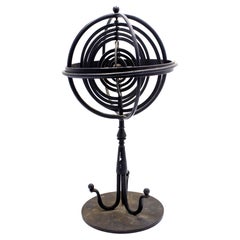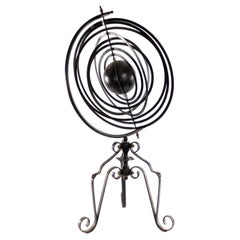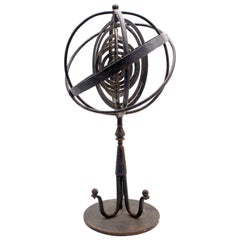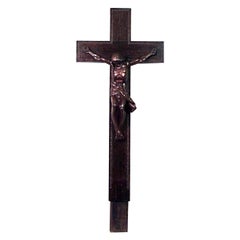Want more images or videos?
Request additional images or videos from the seller
1 of 5
20th c. Iron Armillary Sphere
$900List Price
About the Item
- Dimensions:Height: 20 in (50.8 cm)Diameter: 12 in (30.48 cm)
- Style:Renaissance (In the Style Of)
- Materials and Techniques:
- Period:
- Date of Manufacture:Unknown
- Condition:Wear consistent with age and use.
- Seller Location:Queens, NY
- Reference Number:Seller: GRS2161stDibs: LU97791016356
About the Seller
4.9
Recognized Seller
These prestigious sellers are industry leaders and represent the highest echelon for item quality and design.
Platinum Seller
Premium sellers with a 4.7+ rating and 24-hour response times
Established in 1939
1stDibs seller since 2013
1,004 sales on 1stDibs
Authenticity Guarantee
In the unlikely event there’s an issue with an item’s authenticity, contact us within 1 year for a full refund. DetailsMoney-Back Guarantee
If your item is not as described, is damaged in transit, or does not arrive, contact us within 7 days for a full refund. Details24-Hour Cancellation
You have a 24-hour grace period in which to reconsider your purchase, with no questions asked.Vetted Professional Sellers
Our world-class sellers must adhere to strict standards for service and quality, maintaining the integrity of our listings.Price-Match Guarantee
If you find that a seller listed the same item for a lower price elsewhere, we’ll match it.Trusted Global Delivery
Our best-in-class carrier network provides specialized shipping options worldwide, including custom delivery.You May Also Like
20th Century Steel & Brass Copernican Armillary Sphere c.1930
Located in Royal Tunbridge Wells, Kent
A 20th Century Copernican Armillary Sphere crafted in polished steel and brass. This instrument illustrates the celestial motion of the solar system, with origins tracing back to anc...
Category
20th Century European Other Scientific Instruments
Materials
Brass, Steel
Rare English Nautical Globe with Armillary Sphere (1930) 20th Century
Located in Madrid, ES
Rare English Nautical Globe with Armillary Sphere (1930) 20th Century
Good condition
magnificent globe, with a leather-covered wooden interior terrest...
Category
Early 20th Century English Modern Nautical Objects
Materials
Metal
Exclusive Antique Armillary Sphere
Located in Vlimmeren, BE
An armillary sphere is a model of objects in the sky consisting of a spherical framework of rings, centred on the Earth or the Sun, that represent lin...
Category
Antique Mid-19th Century European Industrial Scientific Instruments
Materials
Metal
A Copernican armillary sphere, Paravia, Milan, Italy 1930
Located in Milan, IT
A Copernican armillary sphere made of iron, paper, brass and wood, with the Sun inside, and the Earth on the outside, made of wood and covered with paper. Pedestal made of turned and...
Category
Mid-20th Century Italian Scientific Instruments
Materials
Brass, Iron
Early 20th Century, Open Turned Wooden Sphere Canton Ball
Located in Vosselaar, BE
A beautifully turned maplewood sphere containg a second star shaped sphere. Objects like these find their origins in the 16th century when the interest in science, mathematics and ar...
Category
Early 20th Century French Architectural Models
Materials
Maple
Ptolemaic Armillary Sphere, Charles-François Delamarche, Paris, ante 1798
By Charles Francois Delamarche
Located in Milano, IT
Ptolemaic armillary sphere
Charles-François Delamarche
Paris, ante 1798
Wood and papier-mâché
covered with printed and partly hand-colored paper
It measures 15.55 in in height x Ø 10...
Category
Antique 1790s French Other Scientific Instruments
Materials
Wood, Paper
$11,345
H 15.56 in Dm 10.95 in
Ptolemaic Armillary Sphere, Charles-François Delamarche, Paris, ante 1798
By Charles Francois Delamarche
Located in Milano, IT
Ptolemaic armillary sphere
Charles-François Delamarche
Paris, ante 1798
Wood and papier-mâché
covered with printed and partly hand-colored paper
It measures 16.37 in in height x Ø 10.94 in (41.60 cm - Ø 27.80 cm)
It weights 2.33 lb (1,058 g)
State of conservation: consistent with its age and use, the paper shows some signs of use, stains and abrasions.
The sphere is Ptolemaic, with the Earth placed at its center, surrounded by the Moon and the Sun mounted on two metal arms.
The sphere is composed of six horizontal and two vertical rings (armillae), each bearing graduations and its own name.
The first horizontal ring is illegible. The others, in descending order are: North Pole, Tropic of Cancer, Equator, Tropic of Capricorn, South Pole.
The vertical rings consist of two double meridians.
The sphere is then connected to the large meridian by two pins, a vertical ring inserted perpendicularly into the circle of the Horizon, in turn supported by four semicircles connected to the turned and black-stained wooden base.
Each element is covered with printed paper. It contains various pieces of information: latitudes, length of days, names and zodiac symbols, calendar, wind directions, etc.
The vertical circles mention the latitudes and longitudes of different cities: Rome, Bordeaux, Madrid, Boston, Batavia (Jakarta), Acapulco, etc.
Even the small terrestrial globe is covered with printed paper: continents and oceans appear with numerous geographical markings indicating the most recent explorations.
In the Pacific Ocean, west of South America bears the following inscription:
GLOBE
TERRESTRIAL
à Paris
chez Delamarche Géog
Rue du Foin Jacques
Au Collège de
M.e Gervais
The North American coasts are well delineated and California appears correctly as a peninsula - reports from Spanish explorers in the region had given rise to confusion as to whether it was connected to the mainland or not. The geographical nature of California was confirmed after the explorations of Juan Bautista de Anza (1774-1776).
Alaska is not described and is only partially traced; it would become part of the United States in 1867.
Various Pacific islands are indicated.
Australia (the name definitely used from 1824) is called "Nouvelle Hollande."
Tasmania is still represented as a peninsula and this is an important detail for the dating of our armillary sphere.
The island is separated from Australia by Bass Strait, which was crossed by Matthew Flinders for the first time in 1798, showing that it was not a peninsula. Delamarche certainly would not have waited a long time to update such an important geographical datum: presumably he did so shortly after receiving the news.
Charles-François Delamarche (1740-1817) founded his laboratory around 1770 and, in a few years, he became the most famous French cartographer and globe maker between the 18th and 19th centuries. After having acquired the laboratory of the late Didier Robert de Vaugondy (1723-1786; himself a renowned cartographer who continued the family business founded by his grandfather Nicolas Sanson in the seventeenth century) and after having purchased, between 1788 and around 1800, the businesses of Jean-Baptiste Fortin (1750-1831) and Jean Lattré (around 1750-1800), he began to call himself "Successeur de MM. Sanson and Robert de Vaugondi, Géographes du Roi and de M. Fortin, Ingénieur-mécanicien du Roi pour les globes et les sphères."
Thus, at the end of the eighteenth century, Delamarche possessed the warehouse stocks, as well as the manufacturing skills of the globes of his main rivals in Paris.
In addition to this aggressive acquisition policy, the key to its success also lay in the combination of high-quality cartography combined with extremely attractive globes and armillary spheres; and, of course, its famous red paint finishing touch.
His laboratory was located on Rue de Foin St Jacques "au Collège Me. (or "Mtre") Gervais" in the Latin Quarter of Paris until around 1805, when he moved to rue du Jardinet No. 13.
On the death of Charles-François in 1817, the reins of the company passed to his son Félix (1779-1835), who continued to publish, often in collaboration with the engraver Charles Dien, Sr. In 1835 the company first moved to rue du Jardinet No. 12 and a little later to rue du Battoir No. 7.
Bibliography:
Dekker, Elly, et al. Globes at Greenwich...
Category
Antique 1790s French Other Scientific Instruments
Materials
Wood, Paper
$11,345
H 16.38 in Dm 10.95 in
A Cast Iron Painted Dog, 20th Century
Located in ARMADALE, VIC
A Cast Iron Painted Dog, 20th Century
Provenance: Private Australian Collection.
Dimensons:
Height: 12cm.
Width: 12cm.
Depth: 9cm.
Category
20th Century Australian Toys and Dolls
Materials
Iron
Cast Iron Scotty Doorstop, Early 20th Century
Located in Charleston, SC
Cast iron scotty doorstop early 20th century.
Category
Vintage 1910s North American Toys and Dolls
Materials
Iron
Ptolemaic Armillary Sphere Charles-François Delamarche Paris, 1805-1810 Circa
By Charles Francois Delamarche
Located in Milano, IT
Charles-François Delamarche
Ptolemaic armillary sphere
Paris, circa 1805-1810
Wood and papier-mâché
covered with printed and partly hand-coloured paper
It measures 15.74” in height, ...
Category
Antique Early 1800s French Empire Scientific Instruments
Materials
Paper, Wood
$10,799
H 15.75 in Dm 11.03 in
More From This Seller
View AllItalian Renaissance Style Iron Armillary
Located in Queens, NY
Italian Renaissance style black iron armillary globe on a round base.
Category
20th Century Renaissance Nautical Objects
Materials
Iron, Wrought Iron
Italian Renaissance Style Wrought Iron Floor Armillary Globe
Located in Queens, NY
Italian Renaissance style wrought iron floor standing armillary globe supported on a 3 scroll leg base.
Category
20th Century Renaissance Nautical Objects
Materials
Iron, Wrought Iron
Italian Mid-Century Wrought Iron Armillary
Located in Queens, NY
Italian Mid-Century Modern wrought iron armillary globe with a center sun surrounded by 9 movable planetary rings on a platform base.
Category
20th Century Italian Mid-Century Modern Scientific Instruments
Materials
Iron, Wrought Iron
20th Italian Renaissance Religious Crucifix
Located in Queens, NY
Italian Renaissance style religious carved crucifix (19th century).
Category
20th Century French Renaissance Religious Items
Materials
Walnut
Italian Renaissance Chrome Armillary
Located in Queens, NY
Italian Renaissance-style (20th Century) chrome armillary globe with a rust patina.
Category
20th Century American Renaissance Revival Scientific Instruments
Materials
Chrome
20th Century Assemblage English Golf Display Case Wall Plaque
Located in Queens, NY
English display case wall plaque with golf iron head, tees, and photo in oak frame.
Category
20th Century British Country Sports Equipment and Memorabilia
Materials
Iron, Wrought Iron
Recently Viewed
View AllMore Ways To Browse
Antique Brass Scientific Instruments
Cabinet Of Curiosities
Telescopes
Instrument Dial
Used Optical Furniture
Optical Antiques
North Wind Furniture
Antique & Vintage Barometers
Antique Thermometer
Antique Curiosity Cabinet
Antique Brass Scale
Antique Office Machines
Antique Telescopes
Antique Gear
Antique Gears
Antique Organs
19th Century Barometers
French Barometer



